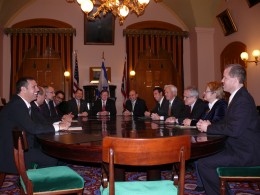
Wednesday, Feb. 15, the Israel Leadership Institute and Wright State University signed a Memorandum of Understanding. The agreement paves the way for more formal cooperation between the two organizations.
Wright State University is partnering with the Israel Leadership Institute to promote academic exchange and international understanding.
The Israel Leadership Institute (ILI) is a nonprofit educational organization that trains Jewish students from around the world to take a more active role in the leadership of Israel. ILI offers educational programs that develop potential leaders, preparing them to meet Israel’s changing needs and future challenges.
Israel’s Vice Prime Minister Silvan Shalom spoke to the Ohio House of Representatives on Feb. 15. Following Shalom’s address, Wright State officials and ILI Executive Director Eeki Elner solidified their partnership by signing a formal memorandum of agreement.
“The purpose of this agreement is to build friendship and goodwill between our two institutions,” said Wright State President David R. Hopkins. “We’re fostering a relationship that will increase intellectual and cultural exchanges between students, faculty and administrators of the Israel Leadership Institute and Wright State University.”
The agreement paves the way for more formal cooperation between the two organizations. In the future, it could lead to the establishment of joint programs and the exchange of professors, lecturers, researchers and students.
The idea for greater exchange between Wright State and Israel came when Ohio State Representatives Cliff Rosenberger, a former student on Wright State’s model United Nations team, and John Adams, who represents counties near Wright State’s Lake Campus, traveled to Israel on a trade mission.
“We’re primarily concerned with the educational benefits such a partnership will have for our students,” said Robert Hickey, Wright State’s associate vice president for public affairs. “But we also see this as having real economic development and trade implications for our region.”

 Inaugural May Daze Craft Beer Fest at Wright State to showcase local breweries, alumni
Inaugural May Daze Craft Beer Fest at Wright State to showcase local breweries, alumni  Wright State nursing, social work students experience challenges of poverty in simulation
Wright State nursing, social work students experience challenges of poverty in simulation  Immortal exhibition
Immortal exhibition  Wright State golf team headed to San Diego Regional in NCAA tournament
Wright State golf team headed to San Diego Regional in NCAA tournament  118 students receive medical degrees during Wright State’s Boonshoft School of Medicine graduation
118 students receive medical degrees during Wright State’s Boonshoft School of Medicine graduation 